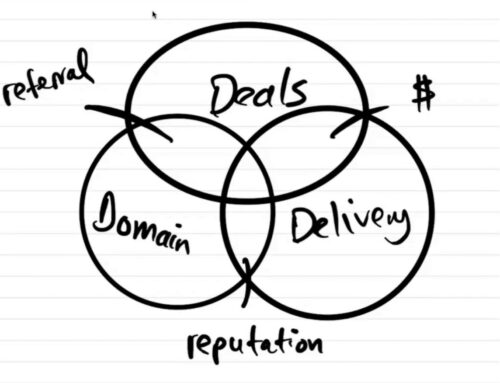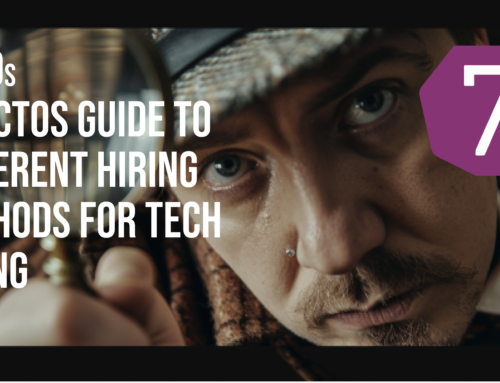Ep.121 Left Brain Right Brain
Are you a technology professional looking to connect with like minded people?
We have a thriving community of CTOs discussing these episodes and more.
Click HERE to set up a call and learn more about becoming a member.
About The Speaker:
 Check out the latest CTO Studio featuring Aaron Longwell. Aaron is the Director of Engineering, INL Justice Sector Support Program and is building the app that hosts all of the Afghanistan Legal System.
Check out the latest CTO Studio featuring Aaron Longwell. Aaron is the Director of Engineering, INL Justice Sector Support Program and is building the app that hosts all of the Afghanistan Legal System.
Episode Resources:
Check out https://7ctos.com/
Episode Transcription:
Nickolai Walker: [00:00:08] Hello. Hello and welcome back to the CTO studio. I am your host, Nikolai Walker, on the mic and in your ear. We are joined today in studio with Aaron Longwell. Welcome, sir. He is the director of engineering and he’s currently building the app that hosts all of the Afghanistan legal system. Let’s get right into this discussion. It is fascinating. We are talking about left brain versus right brain.
Etienne de Bruin: [00:00:35] Two years ago, we would have said to each other, man, you know what? If there was a situation when the whole planet was wearing masks, you’d been like, that’s not possible.
Nickolai Walker: [00:00:44] Well, I know. I would have said that’s just silly.
Etienne de Bruin: [00:00:47] How does that fit into your regression models?
Aaron Longwell: [00:00:51] I mean, a lot of people have asked me that. And I think the one that really stands out for me, I just watch that totally under control documentary. There’s a lot of talk in there about the failings in the supply chain for PPE. And that looks to me like a local optimization problem where we had highly optimized supply chains that brought swabs in from the Lombardy region of Italy and prices when it got cheaper and cheaper, they got better and better doing it. But it’s ultimately a risk. It’s a local optimization that’s not best in the long run. So sometimes inefficiency is better than efficiency when you want to survive. So that’s I think that’s the biggest thing I’ve drawn out of it, is that there’s a lot of good examples of companies that were over optimized or systems that were over optimized, and that ended up not being good in the long run,
Etienne de Bruin: [00:01:52] Which is sort of your mantra, right? Nature has a lot of redundancy in order to pick the best path. And humans went and said, no, no, no, we need to highly optimize to a single path.
Aaron Longwell: [00:02:11] Right. Yeah, it’s I think, and I haven’t thought about it this way, but maybe a way to summarize a lot of what I’ve been thinking about is that nature is a lot sloppier, messier and worse than we think. It’s you know, there’s that old metaphor of the watchmaker God or whatever, that the universe is this highly tuned watch that, you know, works perfectly. It doesn’t work perfectly. There’s all there’s mess everywhere. But the mess is why it succeeds, I think is the the thing that we are starting to learn in a lot of fields. And I think we’re going to be last to learn it in engineering. Like, I think we’re predisposed to not learn it very well, just from what I see. There’s this quote, I just started rereading an older Alan Watts book, and I think at the start of the book he says, you’re only making a mess by trying to put things straight. You’re trying to straighten out a Wigley world, and it’s no wonder you’re in trouble like that. We sort of crave these straight lines and straight crave perfection when it doesn’t it’s not in harmony with the way things worked.
Etienne de Bruin: [00:03:27] But as but as beings that have evolved from this. Nature and from Biology, why did we become like that?
Aaron Longwell: [00:03:39] I think that’s the weird thing is that we there are parts of this that are good. It’s the reason why we have technology like, you know, precision engineering brought us the airplane and brought us, you know, drugs that can save our lives and all these things. I think it’s just when we when we get stuck in thinking that’s the only paradigm. That’s when that’s when it becomes problematic. And that’s where the of the book that I talked about at the end of my talk, that’s where it comes in the Ian McGilchrist book. He talks about how we’ve had this that are are two sides of our brain are sort of honed differently. And he sees these cultural shifts over time where at times the left brain is more dominant. Other times the right brain is more dominant. And he’s essentially just saying that over the last, say, 500 years, we’ve been we’ve been moving to this more left brain model of thinking. We’re more focused on the details were more focused on divisions. We think more narrowly. We think in terms of symbols and maps. We pay less attention to context and we pay less attention to emotions, pay less attention to the body and more to the brain. All of these things, he calls them ways of attending. And it’s it’s not that one is better or worse. They’re they’re both apply in different circumstances and they both enable us to do certain things. And we wouldn’t be what we are without having both capabilities. It’s just that culturally we tend to overweight the left brain. That’s the way that’s the way he sees it, I think. I think there’s a lot of value to that approach.
Etienne de Bruin: [00:05:45] So in the in the left brain, right brain conversations, I know it’s easy to say, oh, left brain is more analytical. In the right brain is more creative. Is that is that too simple or is that.
Aaron Longwell: [00:06:01] Yeah, he. The book is long. And he he spends like I don’t know, the first 20 percent of the book is starts with him apologizing, kind of saying everybody he knows thinks he’s stupid to write a left brain right brain book, because everybody knows that the simple characterizations that everybody has are wrong, like when you test them in the lab. This simple model that the left brain is mathematical in the right brain is creative. They break down and that’s not how it works. But he sort of explains that even that being true, they there are very, very clear differences about how their left brain and the right brain just work. And this is true in all animals. The example that I think drilled at home the most for me, he talks about birds in a bird. The left brain is is the reason a bird is able to pick up a bird seed out of the dirt like it can focus in on the bird unseed, see the boundaries of the seed from the world around it, control its beak to precisely pick it up. The bird’s right brain is able to pay attention to the cat that is stalking it in the periphery. So it’s it’s just that phrase uses ways of attending that the left brain is paying focused attention. The right brain is paying peripheral attention. And so the left brain cares about the divisions of things and the right brain cares about. Well, how does all of this relate? Is that cat close enough to be a threat to me? Is it you know, those bushes look like they’re moving in an odd way that I can’t quite describe, but is a threat to me. So it’s he sort of describes it that you can’t really think of it as like, well, the left brain is, you know, solving the problem. The left brain could be creative in how it figures out how to get the seed out of the dirt and the right brain could be creative. And how it positions the bird to figure out where the cat is or
Etienne de Bruin: [00:08:03] Both sides of the brain would be processing the same signal from its eyeballs. Right. So it’s almost like which part of the image are you honed in on? Is that? Is that.
Aaron Longwell: [00:08:13] Yeah, and there’s some that I’m less knowledgeable about some of that stuff, but some of that is how they know some of these things happened, because they know the left eye’s imagery goes to the right side. And so there’s a delay of communicating that information to the other side of the brain. And there’s different experiments they’ve done to. No, why it’s the left brain that’s doing X and the right brain that’s doing Y. But to your point, all of the same information is coming in to the brain like it’s all it’s just processing the same information, the same environment in different ways.
Etienne de Bruin: [00:08:49] So I know I know this is completely off topic. Well, maybe not, but does the left eye signal, go to the right brain and the right eye signal go to the left brain?
Aaron Longwell: [00:09:02] I’m I’m pretty sure that’s right, at least in birds. I don’t have that book in front of me, but I’m pretty sure that’s right.
Etienne de Bruin: [00:09:09] That’s fascinating. So, in other words, I could potentially hack my brain by closing one of my own.
Aaron Longwell: [00:09:14] Yeah, there’s there’s definitely an experiment somewhere about how that would affect your how you do things. Yeah, I’ll look for that and see if I can find that part of the book. This is a CTO podcast, right?
Etienne de Bruin: [00:09:49] Oh, this is probably the most misleading podcast, because we talk about everything. I kind of like to think of it as what would happen when two CTO types sit in a studio. Versus highly optimized content. I like the redundancy of content, like the regression and the degeneracy of content.
Aaron Longwell: [00:10:18] That’s that’s a good way to put it. We want the most degenerate content we can get.
Etienne de Bruin: [00:10:33] Now, just to kind of think about that left brain, right brain. You mentioned in a talk once that. There’s a communication between the two halves that makes you be able to have a conversation with yourself or to have sort of that observer pattern or the observer. Because I often wonder about how that my brain that is locked in my skull know that it that it can it can talk to. It’s like there’s other entities or invisible entities or.
Aaron Longwell: [00:11:11] Yeah, I think I think this part you’re talking about is the way.. and I totally forget where I thought the basis for this is, but I do remember the details from the book. So the left brain is the Descartes sort of thinking. I think therefore I am like I am this being. That happens to be living inside my brain. That’s kind of the left brain view. Where is the right brain? View is that and this is going to probably sound weird to you. It sounds weird to me and probably sounds weird to the whole audience. But your body is you like your brain just happens to be along for the ride. But you’re right, brain sees your body as yourself. And that’s where some of the weird things where like people have phantom limb senses, like their right brain like knows they still have you know, they’re still operating there. It still exists because there are sense organs that are telling it that and it believes them. Whereas the leg then the left brain, this this correlates to. Well, I there’s there’s one person driving up in my brain, and that is going to resolve to one, you know, one true answer about things. So the left brain craves certainty and the right brain knows that it it like has contradictory sense input, like when you when you play tricks on trying to think of like those AI tricks where you’ve got the line with the arrows going this way and the one’s going this way and the lines the same length, but it’s tricked. Your right brain is able to to know, oh, it’s like those are different length lines because it’s like processing this contradictory information is OK with there being ambiguity in the world because it deals with it all the time. Whereas that’s the left brain that wants to know. Ok, well, is it the same length or not? Let’s get out a ruler and go see like are they the
Etienne de Bruin: [00:13:09] Left brain has an existential crisis about it.
Aaron Longwell: [00:13:13] Exactly, yeah.
Etienne de Bruin: [00:13:15] So then this leads me to sort of, you know, dreams and religion and faith. And I mean, I know this isn’t a Jesus part cost. But the humans need then to make sense of the universe. Why can’t they use the brain, just be like, hey, I was born, this is cool. I will I will I will exist, and therefore there will be a beginning, a middle and an end, and I’m cool with that.
Aaron Longwell: [00:13:53] Yeah and you’re actually touching on one of the pieces that seems to bring a lot of this together is that the there is a strong difference in this kind of thinking in the religions of the world, like the Western religions, the Judeo-Christian tradition is much more left brained and the Asian traditions are much more right brained. In particular, I think Daoism is in particular the most sort of right brained thinking like it’s fairy. Like the the primary Daoist text, the Dow teaching is basically a book of contradictions, like it’s all kinds of things that kind of don’t make sense if you read them one way, but in another sense, they make perfect, epic sense. And so I think there’s some of that. But it’s it’s interesting because you can see like there is the split does not seem to have originated in my mind with like the religions themselves in their origins. It’s more in the cultural tradition that built up around them, you know, like the the Catholic Church sort of becoming hierarchical and becoming a lie, like basically a political power in Europe has, you know, has in my mind has some connection to why, you know, we ultimately have this very left brain approach to the world now, which is in in the talk that I gave last year, the part about depression, military sort of that emerged out of the enlightenment when, you know, the societies were transitioning from this religious power model to this sort of essentially from a model where you were king because God said you were to a model where you were a king, because, you know, people thought you should be or you deserve to be.
Aaron Longwell: [00:16:00] And so it created this set up where the government needed to be needed to justify itself to the people. And so it needed to accomplish things. And in order to accomplish things, it needed to plan them and administer them. And so like the administrative state and formal organized militaries with, you know, you had to be you had to serve in the military started forming. And that’s that’s where like the you know, the origins of pressures where business schools and compulsory schools, that’s where that whole thing comes from. Like the very idea that, well, you should go somewhere to learn what you would need to know. Somebody else has the answers and they’re going to give them to you. It’s very sort of left brain approach to the world. That’s where that all kind of originates. And I think more of the Eastern tradition was was fuzzier. And, you know, the the Western world has dominated for a couple of hundred years. And so that’s that’s why we think the way we think it. And some of these things, you know, just people in other cultures don’t think this way.
Nickolai Walker: [00:17:19] Thanks again for joining us here in studio with Aaron Longwell, who’s the director of engineering INL Justice Sector Support Program, Afghanistan. We will be back again with another interview with him. And we have quite a few scheduled so do stay tuned. Now, if you would, please go over to iTunes to subscribe to this podcast. Also, go check out Aaron Longwells LinkedIn and check out 7CTOs.com. We’ll see you again next time.
Share This Story, Choose Your Platform!
Related Podcasts




